Chaplain Lavern W. Gardai, U.S. Army (Retired) – Serving God and Country
Chaplains in the military are a special breed. Not only do they assume the hardships of their own military service, including long family separations and deployments into combat zones, but they also try to lighten the burdens of the men and women they serve with by helping them carry their loads. Chaplain Lavern W. Gardai, U.S. Army (Retired), who served with the 1st Cavalry Division (Airmobile) in Vietnam and then went on to a distinguished twenty-eight-year Army career, knows these stresses all to well—he lived them firsthand. From ministering to the wounded, to surviving a deadly helicopter crash, he’s done it all. This is his story.
Vern was born in 1931 and raised in Saginaw, Michigan, a city of about 80,000 people located about 100 miles northwest of Detroit. His dad worked the night shift as a maintenance man at the Chevrolet Saginaw Grey Iron Foundry, while his mother stayed at home to raise Vern and his older brother and sister. Vern loved sports and played both football and baseball in high school. Although he wasn’t on the starting squads, he was a tough competitor and always got into the games to contribute.
Vern graduated from Saginaw High School in 1949 and enrolled at Alma College in Alma Michigan, located thirty-eight miles west of Saginaw. He thought about being a lawyer, but he also felt a very strong calling to serve God. To help pay his way through college, his father got him a job working at the foundry as a sweeper and driving an electric truck. In his “spare” time, he played football for Alma, helping the team win a small college championship. His friends also introduced him to Delores “Judy” Schafer and they began to date. Vern knew right away that he’d found the love of his life.
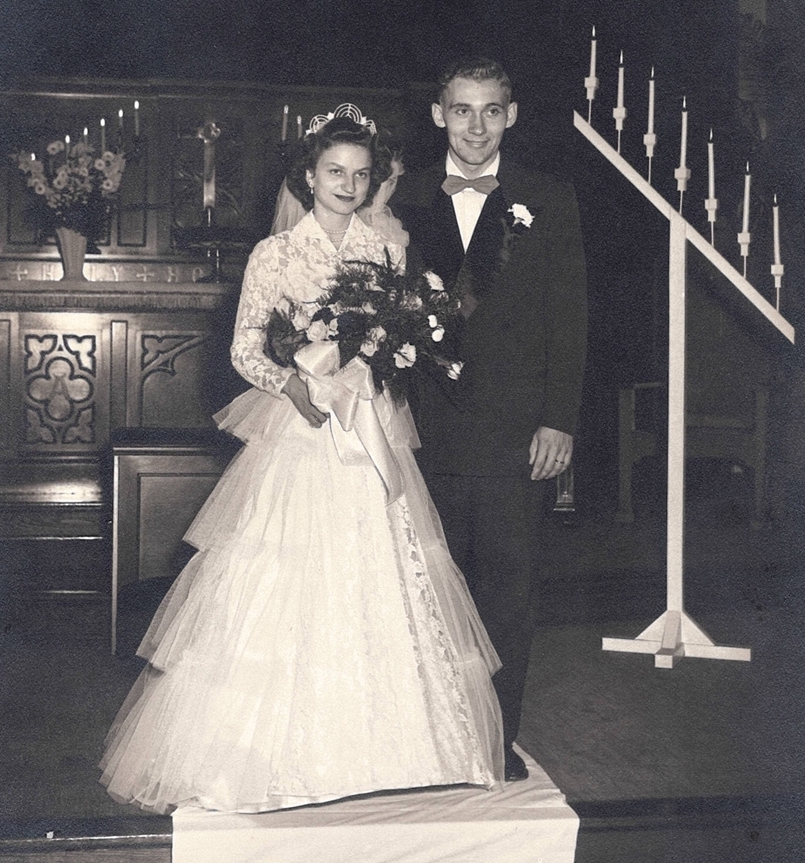
In 1952, after completing two years at Alma College, Vern married Judy and transferred to Central Michigan University in Mount Pleasant, Michigan. His parents were so supportive of the marriage that they bought Vern and Judy a house trailer to help them begin their life together. They rented a mobile home lot in Mount Pleasant and set up their new house, but now Vern’s expenses were significantly greater and he could no longer work at the foundry. To make ends meet, he took a job as a police officer with the Mount Pleasant Police Department, working the night shift from 12:00 a.m. to 8:00 a.m. and then attending classes by day.
Despite all the changes in his life, Vern graduated from Central Michigan University in 1954 and enrolled in Trinity Lutheran Seminary at Capital University in Columbus, Ohio. This meant hitching the house trailer to Vern’s 1954 Mercury and hauling it 320 miles to a mobile home park in Columbus. Vern recalls being surprised at just how hilly the route was, putting a strain on his new car. He had to watch the engine’s temperature closely and stop periodically to let the engine cool and fill the radiator with water. They made it, though, and Vern began his studies to become a Lutheran minister in the fall of 1954.
As was the case in Mount Pleasant, Vern needed to find a job to fund his studies and support his family. This time, he took a part-time job at a Sears & Roebuck catalog store selling appliances and heating and cooling equipment. He was so successful, he outsold the full-time salesmen at the store. His boss told him that if he converted to full-time and stuck with it, he would be making $100,000 by the time he retired. Although that was enticing, Vern knew God had called him to the ministry, so he limited his work at the store to part-time and kept his focus on his studies. To make ends meet, he found additional work driving a bus for a Catholic church and preaching at local churches whenever they needed someone to fill in. Still, his focus remained his studies.
To help students like Vern decide what they wanted to do after being ordained, Trinity brought in speakers from various career fields to talk about their work. As Vern felt a particular calling to evangelism, he found two of the career fields particularly interesting. The first involved introducing Jewish people to Christianity, based upon the work of a minister at the Hebrew Christian Center in Pittsburgh, Pennsylvania. The other involved serving military members as a chaplain in the U.S. Armed Forces.
Neither of those opportunities presented themselves when it came time for Vern to graduate and be ordained in 1958. Instead, he accepted a position as a Lutheran minister in Manistee, Michigan, serving the St. Peters and Norwalk parishes. This time, they left the house trailer behind, selling it in Columbus and moving into the parsonage in Manistee. They stayed there for two-and-a-half years until an opportunity arose at the Hebrew Christian Center in Pittsburgh. After two-and-a-half years there, Vern and Judy decided it was time for a change.
The change was a big one. In 1963, Vern applied to the Lutheran Church to get its endorsement to become a military chaplain. Once the Church endorsed his candidacy, he applied to the U.S. Army and was accepted after passing his physical, beginning his twenty-eight-year career on active duty. His career started in July 1963 with three months of training at the U.S. Army Chaplain School, then located at Fort Hamilton in Brooklyn, New York. Most of the training consisted of classroom instruction learning how to be an Army officer and to minister to men and women of all faiths, with one week of the training spent out in the field.
Vern graduated from Chaplain School as a newly minted 1st Lieutenant (O-2). After taking leave in Saginaw to pick up Judy and their three children, he drove to his first duty station at Fort Benning, Georgia, where he was assigned to the 2nd Infantry Division, known as the Indianhead Division. About a month after reporting, he began working at the Harmony Church Barracks, where the Army conducted Basic Training for new recruits. His duties consisted of conducting Protestant worship services, weddings, baptisms, confirmations, and Bible studies. He also implemented a Bible contest, consisting of twenty-eight questions circulated to the troops to test their knowledge of the Bible. The contest included easy and medium-difficulty questions, with one tricky question designed to act as a tiebreaker. Since first prize included a full-day pass, fifteen dollars, and having Vern complete the winner’s KP (“Kitchen Police”) duties for a day, lots of soldiers participated. When the battalion’s First Sergeant (E-8), a senior enlisted soldier who did not have to do KP, won the contest, Vern did a half-day’s KP for the second-place winner. Lots of soldiers came by the mess hall to watch Vern washing pots and pans. The contest was a big hit and he would use it again later in his career.
In 1964, Vern participated in Exercise Long Thrust IX, a three-month exercise in Europe designed to demonstrate the U.S. capability to quickly reinforce NATO forces. After returning from the exercise, Vern transferred to the newly formed 11th Air Assault Division (Test), which was experimenting with using helicopters to quickly maneuver troops on the battlefield. This meant he had to learn to repel from ropes hanging from hovering helicopters, as well as to climb rope ladders from the ground back into the helicopters waiting above. As if that wasn’t enough, he also became parachute qualified, which he did by conducting five parachute jumps at Airborne School, so he could better relate to the experiences of the soldiers in his unit.
Throughout 1964 and into 1965, Vern participated in all the 11th Air Assault Division’s experimental maneuvers, including an eighty-day war game in the field against the veteran 82nd Airborne Division. The 11th Air Assault Division proved to be such a success that on July 1, 1965, it was redesignated as the 1st Cavalry Division (Airmobile). On July 28, 1965, President Lyndon B. Johnson ordered the division into the escalating war in Vietnam.
Because Judy and the kids were not permitted to live in Fort Benning housing while Vern went off to war, they had to find a rental house off post. This meant not only would Judy have to raise the kids on her own for the next year, but she would also have to do so in an unfamiliar neighborhood and while trying to put the family’s house in order. The move made Vern’s pending departure even more difficult than it already was.
After saying goodbye to his family, Vern deployed onboard the transport ship USNS Maurice Rose as part of the 2nd Battalion of the 3rd Brigade, 7th Cavalry Regiment, 1st Cavalry Division (Airmobile), led by Lieutenant Colonel Robert McDade. The ship sailed from Charleston, South Carolina, through the Panama Canal to Long Beach, California, where Vern got off the ship long enough to call Judy. The ship then began its long voyage across the Pacific Ocean to Vietnam, stopping briefly in Hawaii and then returning to Hawaii when a soldier’s appendix burst and he needed emergency treatment. As the ship continued, Vern held worship services and conducted baptisms and confirmations for the troops who were preparing themselves for what lay ahead. As if the thought of impending combat wasn’t stressful enough, the ship skirted a typhoon in the western Pacific before arriving at its destination, making the last few days at sea particularly uncomfortable.
On September 20, 1965, Vern and the rest of the 2nd Battalion landed in Qui Nhon, a coastal city in the Republic of South Vietnam about 600 miles northeast of Saigon. The battalion moved by helicopter fifty miles inland to its new base camp at An Khe in Vietnam’s Central Highlands. Although an advance party and an Engineering Battalion had prepared the site for the battalion’s arrival, much work remained to protect the camp from enemy attack. Vern was assigned a tent near the camp’s artillery unit, which fired rounds at all times of the day. While the artillery fire kept the enemy guessing, it also made getting a good night’s sleep difficult. Even more sleep-disturbing were the mortar rounds the enemy lobbed into the camp to keep the Americans on edge. To help protect himself from these attacks and absorb any stray shrapnel, Vern stacked sandbags all around his cot.
In November 1965, Vern’s 3rd Brigade was put to the test in the first major battle of the Vietnam War involving U.S. and North Vietnamese troops. On November 14, the 1st Battalion of the 3rd Brigade, under the command of Lieutenant Colonel Hal Moore, helicoptered to Landing Zone X-Ray in the Ia Drang Valley and engaged a significantly larger force of North Vietnamese regulars. Elements of Vern’s battalion joined in the battle, as did U.S. airpower and artillery, while Vern ministered to the wounded and dying soldiers who had been evacuated to the brigade’s forward aid station. The battle at Landing Zone X-Ray raged for three days, ending with Lieutenant Colonel Moore’s forces controlling the battlefield.
Although the 1st Battalion’s fight ended on November 17, the 2nd Battalion’s fight was just beginning. Having been choppered into the fight at Landing Zone X-Ray, instead of flying out as Lieutenant Colonel Hal Moore’s battalion did, the 2nd Battalion marched out in a column headed for Landing Zone Albany. Seeing the 2nd Battalion stretched out in a long line through the jungle, Vietnamese forces ambushed the unsuspecting Americans. Unable to form into a defensive position or call in air strikes or artillery, the 2nd Battalion suffered significant casualties before the North Vietnamese withdrew during the night. One of the men killed in the ambush was Vern’s nineteen-year-old Chaplain’s Assistant, who had become like a brother to Vern. They had been working together since Vern’s initial assignment to the Harmony Church Barracks. In the end, 234 U.S. soldiers were killed and more than 250 were wounded in the engagements at Landing Zone X-ray and Landing Zone Albany, while the North Vietnamese suffered well over 1,000 casualties.
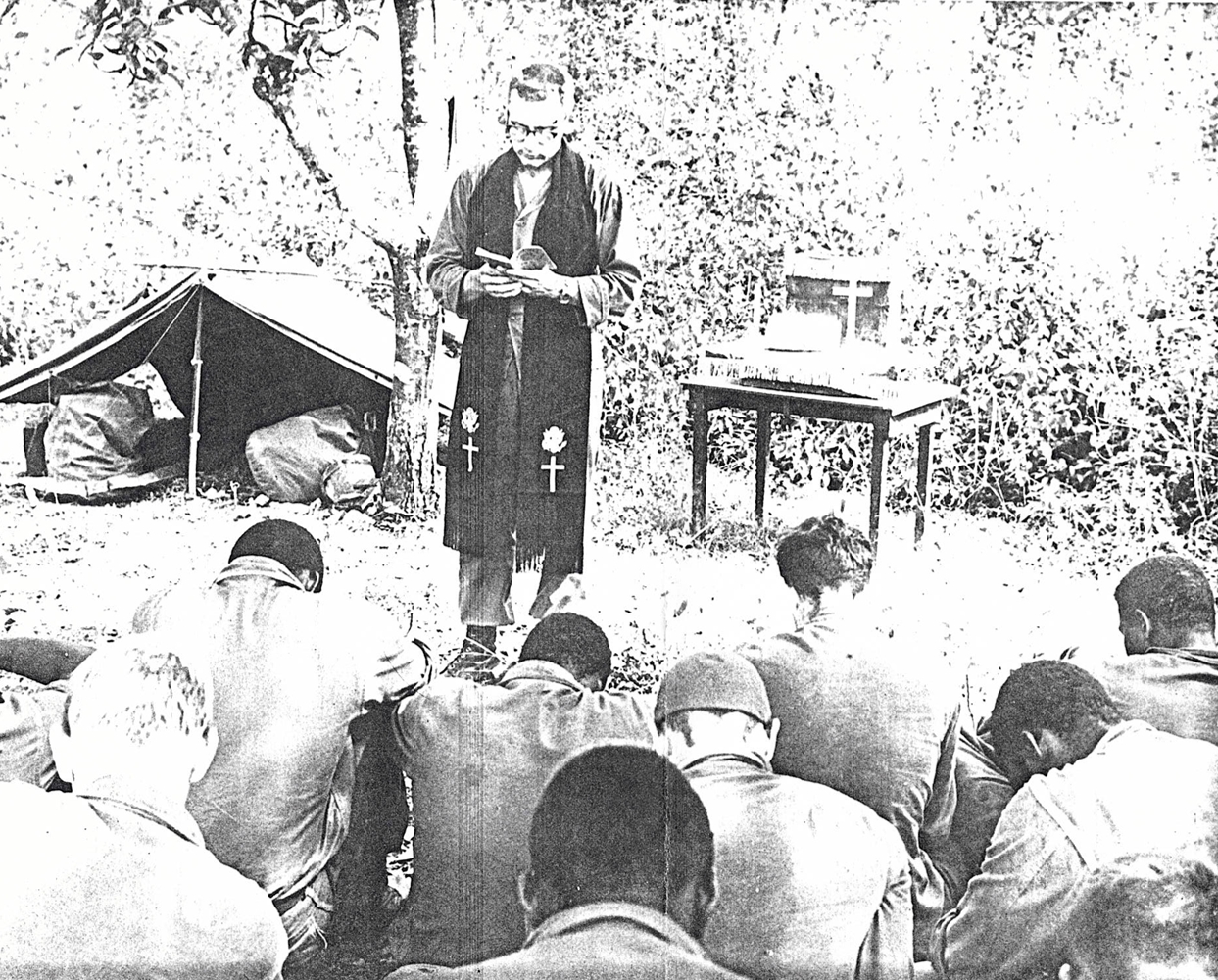
Vern performed a host of Chaplain’s duties throughout his tour in Vietnam. In addition to helping lead men to the Church and providing counsel to young soldiers far from their families and support systems, he led worship services before each mission. These services carried special significance since the men attending never knew if they would make it back alive. Typically, units would spend ten days on a mission and then return to the base camp at An Khe for ten days rest before starting the cycle over again. Vern ministered to the men while they were back in camp and routinely visited them when they stood guard duty around the perimeter of the camp, traveling between posts on a scooter.
When the battalion went on a mission, Vern deployed with it as part of the headquarters company. After the battalion’s maneuver companies completed their search and destroy missions deeper in the field, Vern visited these companies by helicopter to conduct worship services for the men. He always wore a flak jacket in the helicopter on his way to and from these visits and would toss it on the ground when exiting the helicopter. When it was time to depart, he’d retrieve the flak jacket and put it on for the ride back. That practice changed after he picked up his flak jacket for one such return trip and found a big black poisonous scorpion hiding beneath it. Clearly, enemy soldiers weren’t the only things he had to worry about.
On another mission, he went with a patrol looking for a downed aircraft that had crashed somewhere in the vicinity of the camp. They found the wreckage after four or five hours of wandering through the tall elephant grass with bad maps, only to learn the site was just an hour from the camp. Unfortunately, the pilot did not survive.
To stay connected with the soldiers in his battalion, Vern made an effort to walk in their shoes. Although he did not carry a weapon, he knew how to fire all the weapons they employed. When he went with the soldiers into the field, he carried a backpack, a poncho, an entrenching tool, a pup tent, and c-rations, just like they did. In the two ammunition pouches on his belt, he carried “spiritual ammunition” – a small bottle of wine and wafers to give communion and hymn books and Bible verses to distribute whenever the opportunity presented itself.
Vern’s tent was always open to any soldier needing someone to talk to and he routinely flew to visit platoons camped in the field. He also visited wounded soldiers being treated in field hospitals. When a soldier died of his wounds, Vern wrote a letter to his family to try to comfort them in their grief. Although all such letters were difficult to write, none was more so than the ones he wrote to the parents and fiancée of his Chaplain’s Assistant killed at Ia Drang.
On the night before the battalion was to deploy in support of operations around Bong Son, Vern found a distraught sergeant reading a letter in the chapel. Vern spoke to the sergeant and learned he had previously killed a man with a knife in hand-to-hand combat in the Dominican Republic and was concerned he might have to kill again in battle. Vern comforted the sergeant and spoke to him about forgiveness. The sergeant then left to prepare for their 4:00 a.m. departure. The next morning when it came time for Vern to board a C-123 transport plane, the executive officer approached him and said the plane just ahead of Vern’s had crashed and he needed Vern to accompany the rescue efforts at the crash site. When Vern arrived, he was able to identify one of the victims—the sergeant he had spoken to the night before. The sergeant would never have to kill again.
One month before Vern was scheduled to return to the United States, a soldier clearing elephant grass from the perimeter of the camp with a machete stepped into a hole and fell, impaling himself with the machete. He staggered to the vicinity of Vern’s tent, where Vern heard him yelling “help me, help me”. Vern and a doctor responded, and together they eased the machete out of the man’s side. He was seriously injured, though, and needed to be medevac’d to the surgical hospital in Pleiku. Although night had set in and the monsoon rains were upon them, a CH-47 Chinook helicopter pilot agreed to make the flight. Vern and the doctor placed the soldier on a stretcher and lifted him into the waiting helicopter. They then climbed aboard to accompany the soldier to the hospital.
The chopper took off but made it no higher than 200 feet before it came crashing back to earth. Vern remembers being thrown about, his helmet flying off, and the smell of hot oil permeating the air once the helicopter came to rest on its side. Afraid the helicopter would soon burst into flames and he would be burned alive, he prayed “Lord, help me.” Then he heard a voice and saw a red light coming his way. He crawled in the direction of his rescuers, only to realize his leg must be broken. When he emerged from the wreckage, he was put in a Jeep and given pain killers. He watched as rescuers brought the pilot and copilot out through the helicopter’s broken windshield. Both the pilot and copilot survived, but a sergeant and the soldier injured by the machete died in the crash.
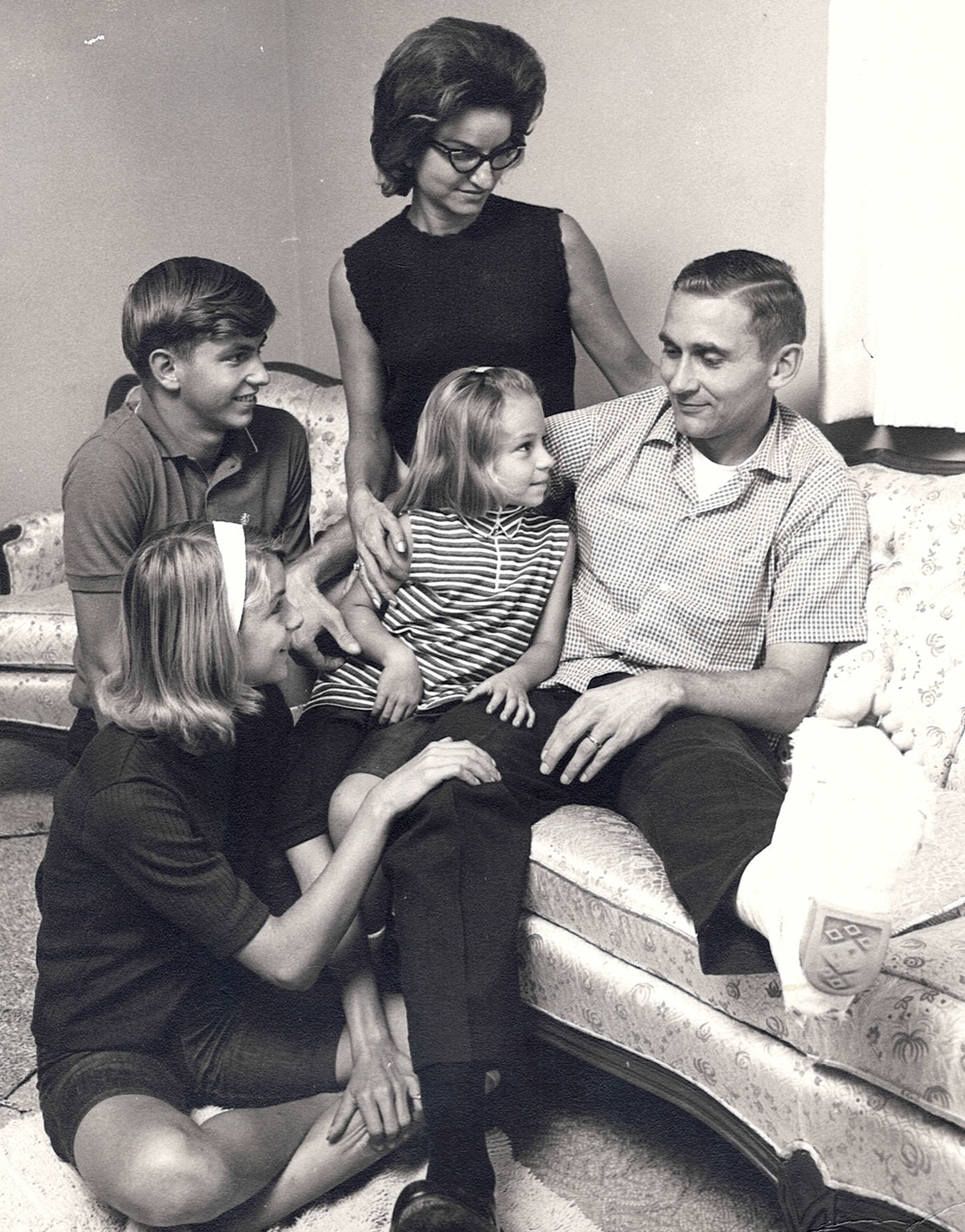
An ambulance transported Vern to the hospital in Pleiku. On July 25, he was evacuated to a hospital in Tokyo via the Philippines, where he was treated for a broken leg and a compression fracture in his spine. He still suffers from back pain resulting from the crash, as well as from exposure to Agent Orange, and has had a total of eleven operations stemming from his service in Vietnam. After ten days in the hospital in Japan, he returned to the United States and reunited with Judy and his children at Fort Benning.
With his war over and now a Captain (O-3), Vern was assigned to the 1st Battalion, 60th Artillery (HERC), which operated a Nike Hercules air defense missile site in Gary, Indiana. He spent two-and-a-half years there and was called on forty-five times to deliver death notices to families in the Chicago area when local soldiers were killed in Vietnam. The duty made him feel like “the angel of death”. He also experienced nightmares from things he’d seen and experienced in Vietnam. It was several years before the nightmares finally stopped.
In 1968, Vern transferred to Heidelberg, Germany. This tour was particularly memorable for Vern because he attended a USAA sponsored chaplains retreat in Israel. Vern paid for Judy, so she got to go too. Vern would visit the Holy Land a total of three times over the next few years, inspiring him for the rest of his life. He also re-instituted the Bible contest he previously employed at Fort Benning and orchestrated two successful retreats attended by hundreds of soldiers on Sex, Love, and Marriage and Taking a Trip with God Instead of Drugs.
In 1972, Vern returned to the United States for an assignment with the 1st Cavalry Division at Fort Hood, Texas. This tour was particularly important for Judy because it gave her the opportunity to complete her master’s degree in Criminal Justice from American Technological University. As Vern’s tour at Fort Hood drew to a close in 1975, Vern thought he would be returning to civilian life when he learned his promotion to major (O-4) was temporary. He was okay with that outcome, believing the Lord would send him where he needed to be. Then, to his surprise, a special promotion board selected him for permanent promotion to major and his Army career continued.
After promoting to major in 1975, Vern was assigned to U.S. Support Activity – Iran, which at the time was still friendly to the United States. As the only Army chaplain in Iran, Vern and his Chaplain’s Assistant visited U.S. military detachments training the Iranian armed forces to use U.S. weapons systems purchased through U.S. military assistance programs. Their travels took them to fourteen cities and twenty-two team houses across Iran. Since his wife and youngest daughter accompanied him to Iran, he traveled with them to visit the historic cities of ancient Persia mentioned in the Bible. Again surprising Vern, he learned he was selected for promotion to Lieutenant Colonel (O-5) while he was in Iran. The U.S. embassy in Tehran fell to Iranian revolutionaries in 1979, one year after Vern and his family departed.
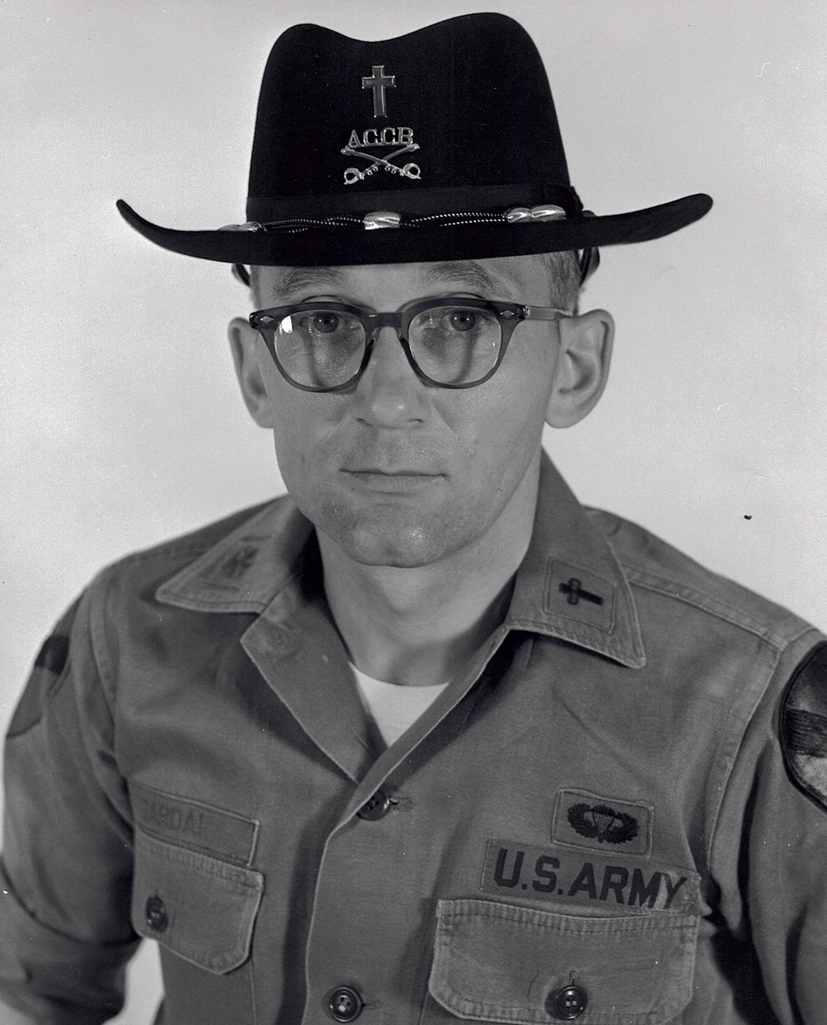
After detaching from Support Activity – Iran, Vern had assignments in Aschaffenburg and Mainz, Germany, Fort Hood, Texas, and Zweibrucken, Germany. In 1987, he took his final set of orders to Fort Sill, Oklahoma, where he served as the lead chaplain for the Basic Training Brigade. He retired in July 1991, having served twenty-eight years on active duty. He was awarded numerous decorations for his service, including the Bronze Star Medal with Oak Leaf Cluster, the Meritorious Service Medal with Oak Leaf Cluster, the Army Commendation Medal with Oak Leaf Cluster, the Presidential Unit Citation-Army, the Vietnam Service Medal with three bronze stars, the Republic of Vietnam Campaign Medal, the Air Medal, the National Defense Service Medal with service star, the Army Service Ribbon, three Overseas Service Ribbons and two Overseas Service Bars, and the Parachutist Badge.
With their Army years behind them, Vern and Judy traveled in Europe before purchasing a home in Colorado Springs, Colorado, where they lived for eighteen years. Vern particularly enjoyed being able to play golf year-round and helping local churches by filling in when they needed a minister. He and Judy also continued their travels in Europe until Judy became ill and could no longer travel. Vern states Judy “joyfully went to heaven” in 2014 and describes the sixty-two years they spent married together as “a taste of heaven”.
Vern now enjoys keeping up with all three of his children and their families. In fact, he lived with his oldest daughter, Lorna, in Texas, before moving to Maryville, Tennessee, where he currently lives with his youngest daughter, Christine. Perry, who followed in his father’s footsteps by graduating from Central Michigan University, is close by, having retired in Toledo, Ohio. Besides family, Vern hosts a veterans’ coffee once a week at the Vienna Coffee Shop in downtown Maryville, giving veterans the opportunity to drink a cup of coffee together and share their military experiences. Each week between three and ten veterans attend.
Voices to Veterans is proud to salute Chaplain Lavern W. Gardai, U.S. Army (Retired), for his twenty-eight years of distinguished service to our country. His selfless service during the Vietnam War brought comfort to countless soldiers going into harm’s way, and his faith in God brought comfort and compassion to our soldiers when they needed it most. For twenty-eight years, he was on call day and night to serve our soldiers. For that, we are eternally grateful. We wish him fair winds and following seas.
If you enjoyed Vern’s story, please sign up for the Voices to Veterans Spotlight monthly newsletter by clicking here. Once each month, you’ll receive a new written veteran’s story and a new podcast directly in your mailbox. Best of all, it’s free and you can unsubscribe at any time.
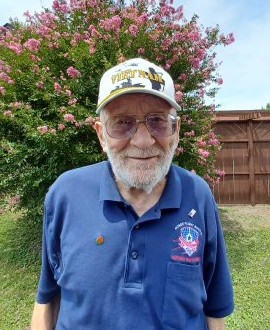

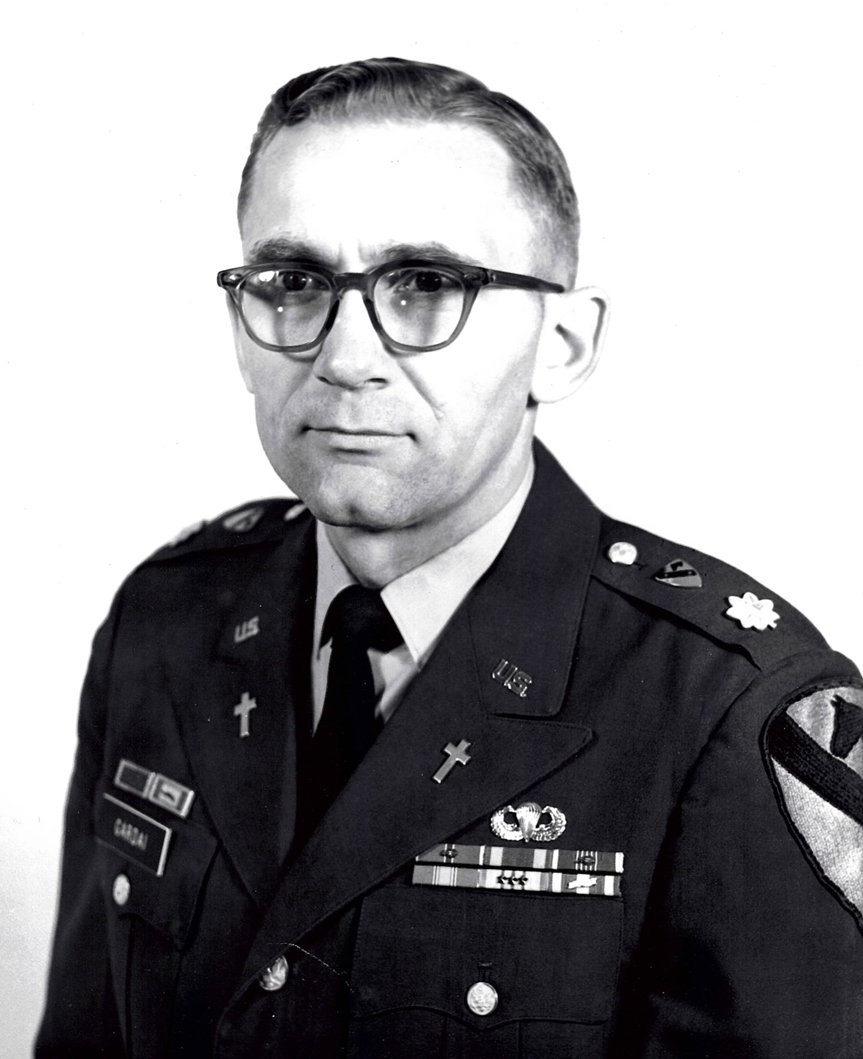
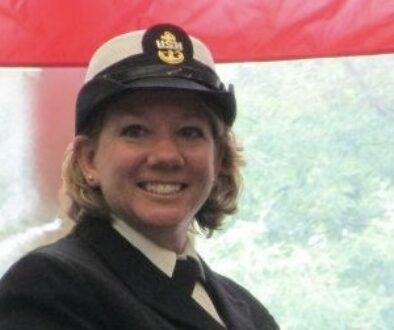
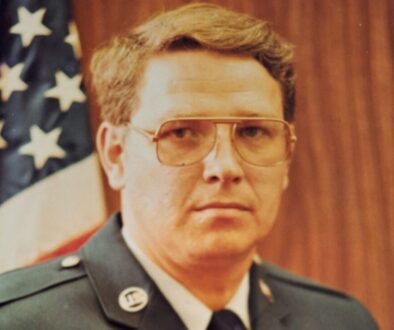
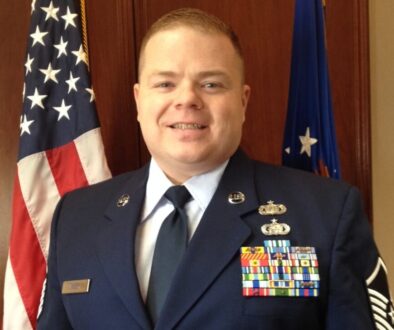
August 21, 2022 @ 3:55 PM
What a great story about a man who worked to care for the soldiers he served. He is an inspiration to every officer in the military.
August 27, 2022 @ 9:38 AM
Richard – Thanks for taking the time to read Vern’s story!
August 23, 2022 @ 10:12 AM
THANK YOU FOR YOUR SERVICE!!!
August 27, 2022 @ 9:39 AM
Ronald – thank you for taking the time to read Vern’s story!
May 16, 2024 @ 1:34 PM
I am pleased to serve with Vern in the Veterans Coffee Fellowship at Vienna Coffee House in Maryville, TN. He is a good friend, an inspiration, and a soldier for God.
May 17, 2024 @ 9:27 PM
Mike, Thanks for reading Vern’s story and I agree with you whole-heartedly!
V/r,
Dave Grogan